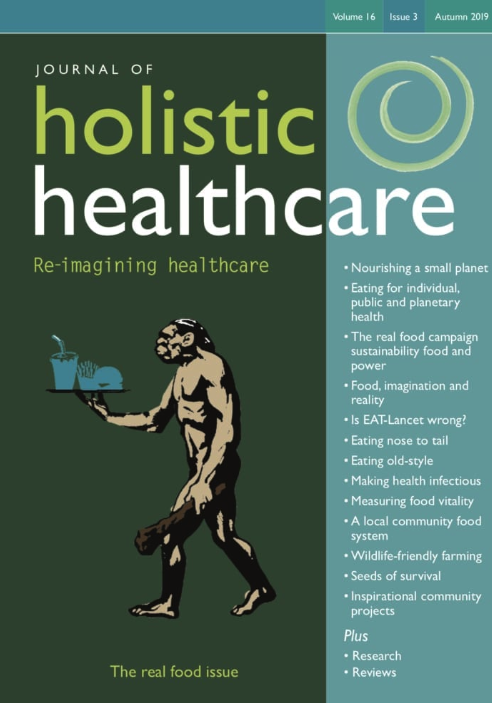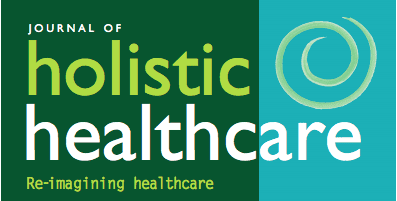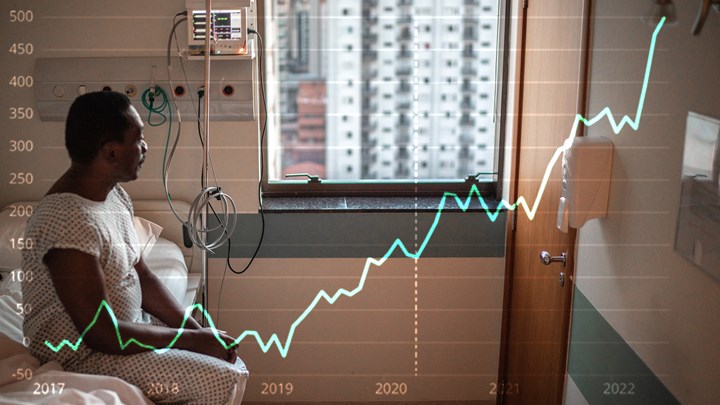Content Sections
Fancy eating animal foods from nose to tail, or plant foods from root to tip? What about eliminating as many air miles as you can and going local? Or eating foods your grandparents would recognise? Did you also hear about the 'planetary health diet' that some think might save both planet and human health (we don't agree, by the way).
All of these real food issues and more are discussed by leading health and environmental experts in the most recent issue of the peer-reviewed Journal of Holistic Healthcare, the journal of the British Holistic Medical Association. The authors of the issue (with the exception of Dr Michael Dixon who was unable to attend) all came together during the last weekend in April 2019 for the inaugural Real Food Gathering on a farm just outside Glastonbury, Somerset, UK. The aim was to convene a cohort of experts who recognise the heavy price the pursuit of cheap food has had on human and planetary health and look at what needs to be done to provide actionable solutions. The weekend seeded a determined new movement espousing real food production at a local level, community support programmes and humane and organic farming practices that recognise the importance of the soil microbiome in human health.
Through the articles, it’s easy to see the inextricably intertwined dependencies between food production systems, human health and the health of the environment around us. Along with the need to transition away from the belief that there’s a one-size-fits-all panacea that allows an ever expanding global population to be fed while climate changing agricultural practices are mitigated. By trying to institute this kind of one-size-fits-all solution regardless of the specific needs, resources, climates and sociology-economic and political circumstances of specific regions, such an approach could result in further industrialisation of food production systems, moving away from the much-needed return to local, agro-ecological zone-specific, seasonal and sustainable food and farming that’s right both for the community it supports - and the environment that, in turn, provides its support.
As it’s World Food Day today, this article provides particularly apt food for thought.

The Real Food Issue of the Journal of Holisitic Healthcare
One size can’t fit all
Food production has become a central issue as we consider how to tackle climate change along with associated environmental degradations and damage. Bringing together the many diverse and disparate views to form a consensus is paramount. There’s little doubt food has the power to harm or heal.
In his article, Dr Michael Dixon, Chair of the College of Medicine, ponders on the importance of diet for our health and the inability of scientists to agree on what constitutes a healthy diet. One that puts the health of citizens before the profits of Big Corporates.
The EAT-Lancet Commission published its findings in January 2019 and has set a global agenda that the food industry and governments seem intent to follow. As the opening speaker at the Real Food Gathering, ANH founder Dr Rob Verkerk explored the EAT-Lancet report and identified areas in which it fell short. His critique of the paper exposes the weaknesses in its one-size-fits-all approach and the very real prospect of its inability to deliver on its promises. You can also read more in our Special Report on the EAT-Lancet report we published in January 2019.
Shaping and forming the basis of our identity, feeding ourselves is a basic human need central to our very survival. It is also a highly emotive driver of human behaviour. Looking through the lens of Human Givens, Dr Andrew Morrice, GP, psychotherapist and educator, highlights the need to form a consensus around healthful diets to protect not just the health of humans, but the environment around us.
What is a healthy diet?
The trillion-dollar question. The answer to which has thus far eluded governments and public health authorities because the solutions are just not individualised enough. Too many people are completely detached from the origins and methods of food production, let alone a diversity of foods. Asking what is a healthy diet, not only for individuals, but a “small planet”, Dr David Peters, Editor-in-Chief, Journal of Holistic Healthcare, considers health promoting traditional diets compared to modern diets that are increasingly damaging our health and environment.
Continuing the theme Heather Rosa, Dean of the Institute for Optimum Nutrition, a big proponent of 'nose-to-tail' eating of animal foods, sought to explore the meaning of 'real food'. As humans have evolved, so has the food we eat and the way we prepare it, not necessarily for the better. The over reliance on ultra-processed foods in the developed world, means many no longer consume the diverse range of nutrient-dense, seasonal whole foods our ancestors once did. As we seek to understand the most ecologically sensitive diet, both for humans and the environment, it seems it’s not the individual foods, but the quality and provenance of foods that needs to take centre stage.
Learning the value of local food
With the growth of large conurbations, food production has become more and more centralised. Recognising the way food shapes our world, Carolyn Steel, from the Sitopia Project, coins the term ‘Sitopia’ (from the Greek sitos, food + topos, place) encouraging us to recognise the true cost of modern food production and once again place value on our food. Given the current healthcare crisis, we have no choice but to rethink the way we live and produce food for the future.
A view that is supported by Phillip Sharratt, Chief Executive, Somerset Local Food Ltd as he seeks to improve the quality of the food we produce and eat, as well as engage communities to recognise the benefits of sustainable agriculture to health. Transition Towns are encouraging communities to work together to transform their local environments by taking the best modern technology has to offer and combining it with traditional skills and values.
Helen Gillingham from Transition Town Wellington reflects on its successes encouraging other like-minded communities to join the movement and work together towards a common goal to reduce their carbon footprint and impact on climate change.
Farming for health, biodiversity and genetic diversity
Decades of intensive farming has left farmland devoid of biological and other forms of wild life. Soils are so depleted in vital minerals essential to plant health, that their ‘vital force’ is vastly reduced. David Thomas, geologist and chiropractor, charts the depletion of mineral levels in our food over recent decades and asks if there is more to foods than just their chemical composition? This being the very reason why Tim Martin founded Farm Wilder. He describes their work to promote farming practices by focusing on regenerating soil to sequester carbon as nature intended and restoring lost biodiversity.
Lawrence Woodward PhD OBE, reflects on the beginning of the organic movement, exploring its limitations and the need to move towards whole health agriculture. But what of the seed so needed to facilitate whole health agriculture? Vital Seeds was co-founded by Fred Groom to provide an antidote to the loss of crop diversity and control of seed markets by global corporatocracies. Their mission is to promote the use of heritage crop varieties and seed saving to encourage genetic diversity in crops to allow them to become fully adapted to local environments.
Reconnecting to our food roots
A common theme running through the event and this journal issue, is the call for a move away from ultra-processed foods to return to food produced via sustainable farming systems. Iszabella Natrins, nutrition and lifestyle health coach, suggests a good way to reconnect with our food roots is to consider if our Grannies would recognise the food we now eat. If you need a chemistry degree to decipher the label, the answer is probably not and therefore it's unlikely to be very good for one's health either. Another important element is provenance and being more efficient about how and what we eat. For plants foods this might mean 'root-to-tip' eating, for animals, 'nose-to-tail' eating. This is a far cry from what we see in most of today's supermarkets.
Ultimately, until we’re prepared to acknowledge the inseparable links between food production and human health, the spiral of chronic and autoimmune diseases will continue. Rather than chasing space-age solutions to stone-age problems, we should be focusing on restoring natural rhythms and bringing health back to our soils, plants, humans and our planet.
Our actions now need to be focused on rebalancing Nature’s delicate webs and networks so they may nurture themselves and all that lie within them, for this generation and many to follow.
Download the autumn issue of the Journal of Holistic Healthcare to read in full all of the articles mentioned above.








Comments
your voice counts
19 February 2024 at 9:40 am
The Real Food 'Issue' typically refers to concerns and debates surrounding the production, distribution, and consumption of food that is considered natural, minimally processed, and nutritionally dense. It involves a shift away from highly processed and artificial foods towards whole, unprocessed options. Issues include sustainable farming practices, ethical treatment of animals, the impact of food choices on the environment, and the promotion of healthier eating habits. The movement advocates for a return to locally sourced, organic, and unmodified foods, emphasizing their potential benefits for both personal health and the well-being of the planet.
Your voice counts
We welcome your comments and are very interested in your point of view, but we ask that you keep them relevant to the article, that they be civil and without commercial links. All comments are moderated prior to being published. We reserve the right to edit or not publish comments that we consider abusive or offensive.
There is extra content here from a third party provider. You will be unable to see this content unless you agree to allow Content Cookies. Cookie Preferences